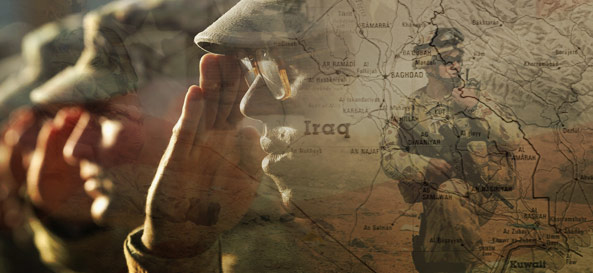
Ten years ago this month, the U.S. government, claiming a connection between the September 11th attacks and dictator Saddam Hussein, invaded Iraq. At the time, it was difficult to find a critical mass decrying, or even cautioning against, the rush to war.
But as the War in Iraq unfolded, national sentiment and individual emotions ran the gamut. At times, it seemed most of us were deeply satisfied with the destruction of Saddam’s statue and his humiliation in a rat hole outside of Tikrit. At other times, many felt deeply embarrassed and disturbed as we watched the country’s descent into chaos, the millions who were displaced and the permanent marring of America’s image through the Abu Ghraib torture scandal. Ultimately, many questioned the efficacy of war altogether.
When my wife and I moved to Iraq in 2006, we began to see these effects of war closer than ever before. And now, ten years after the first U.S. invasion of Iraq, I am seeing our emotions and opinions about the war are even more mixed.
I set out to understand those who began pro-war, and found themselves “unlearning war” over the last decade. What emerged was a troubled picture of young men seeking approval, respect and vengeance as they enlisted en masse.
Ross Caputi fought in Fallujah in 2004—the bloodiest battle involving American troops since the Vietnam war—and the symbol of winning the battle and losing the war for public support.
“I gave little thought to whether or not it was right or wrong to go to war with Iraq,” he says. “I thought that being a combat veteran would make everyone in my hometown respect me. So I made the decision to go to war from the perspective of a young boy who was looking for acceptance and adventure.”
Caputi, the founder and spokesperson for the Justice for Fallujah Project, is now considered a coward and a traitor by many for defending the Iraqis’ right to fight against U.S. soldiers.
“My transformation was very slow and messy,” he says. “But I became increasingly conflicted during the Second Siege of Fallujah, when we destroyed an entire city.”
And that’s what it took for Caputi to realize his expectations for enlisting to serve did not line up with the reality of war. “It is very hard to explain how I rationalized those events in my head. I always knew that America was an empire, but I never fully understood the immoral implications of being an empire.”
As surprising suicide rates among U.S. veterans made headlines, veterans like Logan Mehl-Laituri concluded that promises of glory in the name of God and country were setting soldiers up for a miserable post-deployment experience.
“The major obstacle can be loneliness—think of all that camaraderie from the service gone overnight,” Mehl-Laituri says.
To combat such loneliness, he founded the Centurions Guild. Mehl-Laituri says, “We hope to be a place where Christian faith can be positively informed by military service, where patriots and pacifists share their stories and resources so that all can be enriched in their faith.”
While Caputi came to oppose “occupying American aggression,” he maintained the right of Iraqis to take up arms to fight in defense. But Mehl-Laituri arrived at a different conclusion.
“There was a lot I never thought about as a Christian in uniform. The question before me was whether I could kill those I was commanded to love. I decided I could not. I’ve just been trying to be honest to that, nothing more.”
But Americans are not the only ones who have stepped back from war and all that it promises to achieve. Born in Iraq, Sami Rasouli immigrated to America, met the Christian Peacemaking Team and was inspired to establish the Muslim Peacemaking Team near the start of the war.
“I became ill watching the sad news of massive death and pain. I decided [on] a different mission: working for peace and justice,” he says.
“Growing up in Iraq, Islam taught me unity: that our creator is one, the universe is one, and we, the people, are one. I learned unconditional love from Christianity in the U.S. And that brilliant combination—the unity that leads to loving our enemies—helped me define my mission to teach peace, friendship and diplomacy instead of learning war.”
Cody Fisher sought out military recruiters on his college campus right after the Twin Towers fell on 9/11.
“I grew up on the story that good guys go off to war and the bad guys get what they have coming,” he says.
Ultimately, Fisher ended up in Iraq providing humanitarian assistance instead, but he still had a “good guys vs.bad guys” filter for viewing the world around him. But Fisher, Mehl-Laituri and Caputi all note how these simplistic views began unraveling as soon as they got to know their enemies on a personal level.
Fisher explains: “Being in Iraq and living in community caused me to look again at the life and death of Jesus. It was the preemptive, enemy-love of God in the death of Jesus Christ on the cross that ultimately changed everything for me. If I want to call myself a follower of Jesus, my life has to look like the one who redeemed me, even while I was his enemy.”
Those who oppose war are often cast as naive, emotional and even sometimes anarchist. So when I asked, “What are you doing to help others ‘unlearn’ war?” I was surprised to find so many war veterans starting with themselves:
“I’m using less ‘us’ and ‘them’ language.”
“I’m working to educate myself and better understand my [deployment].”
“I really don’t want to change anyone’s minds, I just want there to be better dialogue.”
Fisher, who founded the Preemptive Love Coalition in Iraq to heal children’s hearts, paints the most surprising picture: “I focus on fixing myself; disarming my own heart. Lowering my fists—even before others lower theirs.”
Of course, peace movements that wag the finger at the past offer little new. What is needed is looking and moving forward. What is needed is the audacious claim that things don’t have to be the way they are, that we can actually create the future through our liturgy, our prophetic resistance and our participation with the God who is presently active in the world, making all things new.
So, this Holy Week, as Christians say, “Jesus is King!” we remind each other that presidents, dictators—past and present—are not, and we commit ourselves anew to the prophetic faith that critiques by creating beautiful alternatives to every broken promise of an empire that will not hear and cannot save.






















